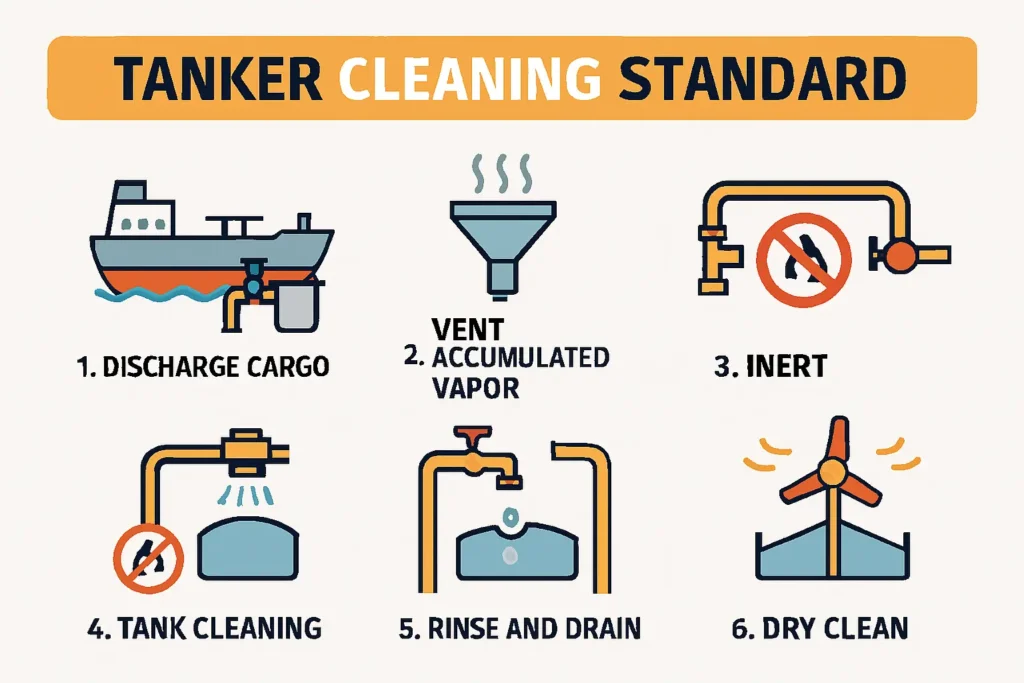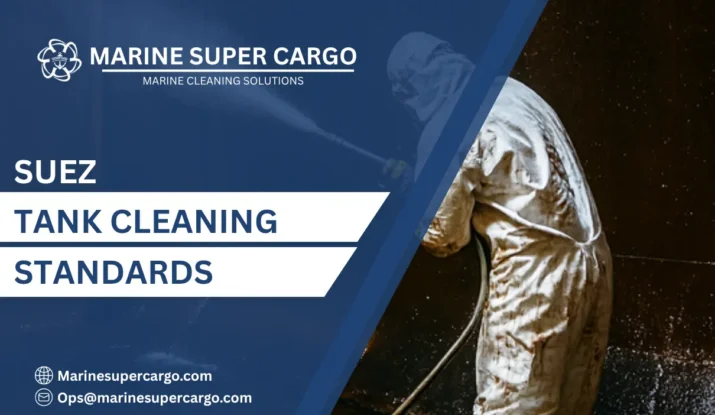Maintaining Excellence in Tank Cleaning Operations
Implementing rigorous Suez tank cleaning standards ensures vessels achieve optimal cleanliness levels while maintaining environmental compliance and operational efficiency. Quality assurance protocols establish systematic approaches to tank preparation, verification, and documentation that meet international requirements and commercial expectations. At Marine Super Cargo, we champion industry-leading quality standards that consistently deliver superior results for vessel operators transiting through Egyptian waters.
Suez tank cleaning standards encompass comprehensive methodologies covering equipment specifications, procedural protocols, safety requirements, and environmental protection measures. These standards align with international conventions while addressing specific regional considerations relevant to operations in the strategically vital Suez Canal corridor.
MARPOL and IMO Regulatory Framework
MARPOL Annex I establishes fundamental Suez tank cleaning standards for oil tankers, mandating specific procedures for crude oil washing, tank ventilation, and residue management. Compliance with these international standards forms the foundation for acceptable tank cleaning practices at Suez and worldwide.
MARPOL Annex II governs chemical tanker operations, establishing Suez tank cleaning standards for noxious liquid substances. The regulations specify pre-washing requirements, residue discharge criteria, and ventilation procedures that must be followed before cargo transitions or port entry.
The IMO provides detailed technical guidance supporting Suez tank cleaning standards through various codes and circulars. The International Bulk Chemical Code (IBC Code) defines specific cleaning requirements for different chemical categories, while the International Safety Guide for Oil Tankers and Terminals (ISGOTT) offers comprehensive best practices for petroleum operations.

Equipment Standards and Specifications
Tank cleaning machines represent critical equipment for achieving Suez tank cleaning standards. Fixed machines permanently installed in tanks must deliver adequate pressure, flow rate, and coverage patterns to remove cargo residues effectively. Portable machines used for specialized applications should meet comparable performance specifications.
Suez tank cleaning standards require regular equipment maintenance and performance testing. Worn nozzles, damaged seals, or malfunctioning drive mechanisms compromise cleaning effectiveness, potentially causing inspection failures and cargo contamination. Documented maintenance programs demonstrate commitment to quality assurance.
Procedural Quality Controls
Suez tank cleaning standards mandate systematic procedural approaches beginning with thorough pre-cleaning assessments. Crews evaluate previous cargo characteristics, tank coating conditions, and next cargo requirements to determine appropriate cleaning methodologies, equipment selection, and quality verification criteria.
Washing cycle parameters must align with Suez tank cleaning standards specifying minimum durations, water volumes, and machine rotation patterns. Abbreviated cycles may fail to achieve required cleanliness, while excessive washing wastes resources without improving results. Optimal parameters balance effectiveness with efficiency.
For detailed procedural guidance, review our comprehensive resources on systematic tank cleaning approaches and quality control methodologies.
Environmental Protection Standards
Suez tank cleaning standards incorporate strict environmental protection requirements preventing pollution during operations. All tank washings, residues, and contaminated water must be retained aboard vessels or transferred to authorized shore reception facilities. Illegal discharges result in severe penalties and potential criminal prosecution.
Waste segregation protocols support Suez tank cleaning standards by facilitating proper disposal. Oily wastes, chemical residues, and contaminated water require different handling and treatment processes. Proper classification ensures appropriate disposal methods and regulatory compliance.
Documentation and Record-Keeping Requirements
Suez tank cleaning standards mandate comprehensive documentation demonstrating compliance with procedural requirements and quality specifications. Tank cleaning logs record operational parameters including washing durations, water temperatures, cleaning agent quantities, and equipment used during operations.
Oil Record Books and Cargo Record Books contain entries documenting tank cleaning activities as required by MARPOL. These records undergo scrutiny during port state control inspections, with deficiencies potentially resulting in vessel detention and substantial penalties.
Personnel Training and Competency
Achieving Suez tank cleaning standards consistently requires properly trained personnel understanding technical requirements, safety protocols, and environmental protection measures. Marine Super Cargo provides comprehensive training programs developing crew competencies essential for quality tank cleaning operations.
Continuous Improvement Practices
Suez tank cleaning standards benefit from continuous improvement initiatives identifying opportunities for enhanced performance. Analyzing cleaning operation outcomes, surveyor feedback, and equipment performance data reveals areas requiring attention or modification.
Technology adoption supports quality enhancement efforts. Advanced cleaning machines, improved chemical formulations, and sophisticated monitoring equipment enable better results with reduced environmental impact. Marine Super Cargo stays current with technological developments, implementing innovations that advance quality standards.
Frequently Asked Questions
Q1: What are the minimum water temperature requirements under Suez tank cleaning standards?
Temperature requirements vary by cargo type, typically ranging from 60-80°C for petroleum products. Chemical cargoes may require specific temperatures based on product characteristics. Cold water washing suffices for certain compatible cargo transitions.
Q2: How often should tank cleaning equipment be tested to maintain quality standards?
Tank cleaning machines should undergo performance testing quarterly or after 500 operating hours, whichever occurs first. Documentation of testing and maintenance activities demonstrates commitment to quality assurance.
Q3: Are there specific cleaning agents prohibited under Suez environmental standards?
Cleaning agents must be biodegradable and approved for marine use under IMO guidelines. Products containing substances harmful to marine ecosystems or leaving problematic residues are prohibited in Egyptian waters.
Q4: What documentation must vessels maintain to demonstrate compliance with tank cleaning standards?
Vessels must maintain tank cleaning logs, Oil Record Books, Cargo Record Books, equipment maintenance records, crew training certificates, and all survey reports documenting inspection outcomes and cleanliness verifications.
Q5: How do Suez tank cleaning standards differ for food-grade cargo preparation?
Food-grade preparations require the highest cleanliness level (“hospital clean”), use only approved cleaning agents, prohibit previous carriage of toxic substances, and mandate detailed documentation including material safety data and compatibility certificates.
For professional tank cleaning services meeting the highest Suez quality standards, contact Marine Super Cargo today.


